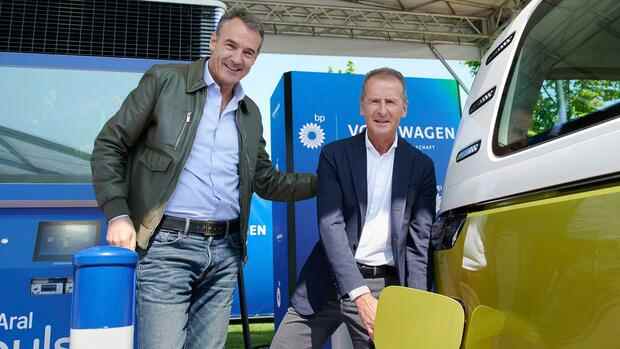BP CEO Bernard Looney (left) and VW CEO Herbert Diess put the first “Flexpole” charging station into operation in Düsseldorf.
(Photo: Volkswagen Group)
Dusseldorf Volkswagen and the British oil company BP are cooperating to set up a charging network for electric cars. The Wolfsburg-based automotive group is supplying BP with thousands of fast charging stations, which are to be used primarily in Great Britain and Germany. In Germany, the British group is equipping the gas stations of its German subsidiary Aral with the new charging stations. BP put the first of these charging stations into operation in Düsseldorf on Thursday.
The VW Group and BP initially want to create 4,000 new charging points over the next two years as part of the cooperation. In a second step, further European countries are to be added by the end of 2024, increasing the number to up to 8,000 charging points.
The “Flexpole” charging stations allow fast charging with a charging capacity of up to 150 kilowatts. They are set up at BP and Aral petrol stations. The mineral oil company wants to appeal in particular to drivers of electric cars who do not have a wall box and cannot charge at home.
BP CEO Bernard Looney spoke in Düsseldorf of a “perfect partnership” between two companies that had previously been active in different business areas. Volkswagen CEO Herbert Diess made a similar statement. Ten years ago, nobody could have imagined that the bosses of a mineral oil company and a car manufacturer would jointly announce the start of a charging network cooperation.
Top jobs of the day
Find the best jobs now and
be notified by email.
Looney specifically praised Volkswagen’s electric course. The Wolfsburg car company is doing “extraordinary things” in the transition to electromobility. “If Volkswagen becomes electric, then the world will also become electric,” said the BP boss. As one of the world’s largest car manufacturers, the VW Group could trigger the necessary change in awareness.
BP expects larger sales of charging current
The BP boss said that the oil company would soon achieve larger sales from the sale of charging current. “It’s coming faster than we all think,” he said. However, he did not specify a specific year in which BP will achieve greater sales with the charging current than with classic petrol and diesel sales.
According to Looney, there is no threat to gas stations from the charging current business. Rather, there are opportunities for completely new business areas.
VW CEO Herbert Diess described the commissioning of the first Aral charging station as a “turning point”. Mineral oil companies like BP could make a significant contribution to ensuring that electromobility quickly catches on in Germany and Europe. A further acceleration can be expected if the electric drive also prevails in trucks.
Volkswagen and BP rely on the comparatively high flexibility of the new “Flexpole” charging station. It can simply be set up in the open space of a gas station without major construction work. The pillar developed by VW also does not need a high-voltage connection, the usual household 220 volts are sufficient.
Petrol stations can simply set up additional charging stations if required
Storage batteries are installed inside the charging station. The cars are then loaded via these storage systems; the storage batteries, in turn, draw their energy from the normal power grid. The new device can charge two e-cars at the same time with up to 150 kilowatts.
Depending on the model, this is enough to power an electric car for a range of up to 160 kilometers in ten minutes, according to Volkswagen. The capacity of the storage batteries is 200 kilowatt hours. A single column should cost around 150,000 euros.
>> Read herewhere Tesla is still ahead of Volkswagen in electric cars
BP boss Looney spoke of the great advantages of charging technology from Volkswagen. There are no long approval times for BP because the charging stations do not need a special power connection, but can be connected to the existing network. “That helps a lot,” Looney said. In addition, additional charging stations could simply be set up at the gas stations if demand grows accordingly.
The VW Group has also entered into partnerships in charging infrastructure in other European countries. In Spain, the main traffic routes are to be developed in cooperation with the electricity company Iberdrola. CEO Diess announced that details would be announced shortly. In Italy, Volkswagen wants to cooperate with the electricity giant Enel to expand the fast charging network both on the motorway and in urban areas.
Volkswagen intends to spend around 400 million euros across Europe on the entire program by 2025. Then the VW Group wants to operate around 18,000 public fast charging points in Europe in association with its various partners. This corresponds to about a third of the total demand forecast for 2025 on the European continent.
More: This is how car manufacturers accelerate the development of new models
